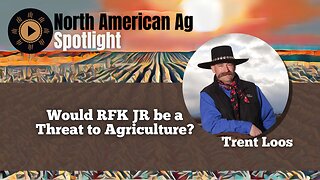Premium Only Content

New Resources for Spanish Speaking Producers Through Farm Aid
Listen to the podcast here - https://www.northamericanag.com/north-american-ag-spotlight - New Resources for Spanish Speaking Producers Through Farm Aid
This week on North American Ag Spotlight Chrissy Wozniak talks to Caitlin Arnold Stephano, Hotline Program Manager at Farm Aid about their new Spanish-language hotline for Spanish producers and farm workers.
In partnership with Migrant Clinicians Network (MCN), and with funding from the Farm and Ranch Stress Assistance Network – Northeast (led by Cultivemos), Farm Aid is providing Spanish-language hotline support through the organization’s new Spanish-speaking hotline. Beginning and established farmers and farmworkers are encouraged to call the Farmer Hotline. Farm Aid’s hotline operators are familiar with agriculture and with resources for farmers around the country; they work with hotline callers to find the best resources for their individual situation, whether they are looking for assistance with farm stress, financial issues, legal questions or business-related questions. The Farm Aid Hotline Staff has an existing database of Spanish resources and they are working to expand this database even further.
Through the Farm Aid hotline and email service, Farm Aid’s Hotline Staff refers farmers to an extensive network of family farm and rural support organizations across the country. All farmers can call the hotline at 1-800-FARM-AID (1-800-327-6243).
It’s well documented that the suicide rate has been higher for farmers than for the general population for decades. And a December 2017 front page story in The Guardian brought to America’s attention a harsh reality about its farmers: people working in agriculture in the U.S. — including farmers, farm laborers, ranchers, fishers and lumber harvesters — take their lives at a rate higher than any other occupation.
Today, mental health support services — both professional and church- and community-based — are less available and accessible in rural areas than they were in the 1980s, due to factors such as fewer people attending church, fewer community-building events in which people can interact/establish relationships in rural areas, and a decrease in overall population among rural areas.
In general, rural residents have higher rates of depression, substance abuse and completed suicide. However, farmers face additional challenges to maintaining their mental health. Mental health professionals point to the nature of farming as one likely cause — it is a business largely influenced by factors that are beyond farmers’ control, including weather, disease, pests, prices and interest rates, and which can come and go without warning. Farmers can be isolated, geographically and socially, since they often work alone. They are self-reliant, independent and can be unlikely to ask for help. Many come from a tradition of not sharing their challenges, choosing instead to tough them out on their own. They work long, hard days and may deprioritize their own health and well-being to get the job done. Stress as a concept may often be seen by farmers as something that urban office dwellers experience. Farming itself is unique, and many clinicians don’t “get it.” Farmers cannot be advised to take a vacation or search for a less stressful job. Farmers feel a tremendous weight at the possible loss of their land, the possibility that they could be the one to lose something that has been in their family for generations. Their role as a farmer is at the root of their identity; it’s their culture, not just a job.
Due to the nature of their work, farmers often lack health insurance coverage, or have minimal coverage that covers catastrophic injury only, rather than comprehensive care. If they do have insurance, behavioral health services may be considered “out of pocket.” As people who often keep their personal struggles to themselves, farmers worry about their privacy; it can be a challenge to seek care and maintain anonymity in small, rural communities.
To further complicate matters, farmers and rural Americans face barriers to accessing mental health care. Ninety million people live in designated Mental Health Professional Shortage Areas, per the U.S. Department of Health and Human Services, and a majority of those areas (61 percent in 2011) are in non-metropolitan areas. About 4,000 to 6,000 new mental health professionals are needed to fill that gap nationwide. A dramatic illustration of this shortage can be seen in the state of Iowa, where there are 123 psychiatrists, 122 nurse practitioners and 33 physician assistants that specialize in psychiatry, statewide. That equates to one trained professional for every 11,151 Iowans. Right now, as farmers struggle with a 50 percent decrease in net farm income since 2013, the incidence of farmer stress is reaching a high point. In 2018, the predicted median net farm income is a loss of $1,300, and prices are not expected to rise in the near future. Meanwhile, production expenses and interest rates are increasing, putting family farmers in a vise that is forcing many to call it quits, or consider worse.
Farm Aid’s mission is to build a vibrant, family farm-centered system of agriculture in America. Farm Aid artists and board members Willie Nelson, Neil Young, John Mellencamp, Dave Matthews and Margo Price host an annual festival to raise funds to support Farm Aid’s work with family farmers and to inspire people to choose family farm food. For more than 35 years, Farm Aid, with the support of the artists who contribute their performances each year, has raised more than $64 million to support programs that help farmers thrive, expand the reach of the Good Food Movement, take action to change the dominant system of industrial agriculture and promote food from family farms.
Caitlin Arnold Stephano grew up riding the tractor at her Grandfather’s cherry and apple farm in Eastern Washington state, and has been working in agriculture, farmer organizing, and advocacy since 2006. Caitlin holds a Masters in Sustainable Food Systems with a focus on farmer mental health. She currently lives in Southern Maine with her family, and loves exploring the coastal nooks and crannies, walking in the woods, and growing her garden.
Learn more at www.farmaid.org
#farm #farming #agriculture
North American Ag is devoted to highlighting the people & companies in agriculture who impact our industry and help feed the world. Subscribe at https://northamericanag.com
This episode is sponsored by AMS Galaxy - BRINGING PRECISION DAIRY EQUIPMENT TO THE AMERICAN FARMER. Spend more time doing what you love. Use technology to your advantage.
Visit https://agr.fyi/galaxy
Want to hear the stories of the ag brands you love and the ag brands you love to hate? Hear them at https://whatcolorisyourtractor.com
Need help with your agriculture based company's marketing plan? Visit https://chrissywozniak.com
Don't just thank a farmer, pray for one too!
-
 49:02
49:02
North American Ag Spotlight
25 days agoWould RFK JR be a Threat to Agriculture? With Trent Loos
1721 -
 2:32:19
2:32:19
DemolitionDx
8 hours agoSunday night COD with friends.
88.9K4 -
 2:10:14
2:10:14
vivafrei
19 hours agoEp. 237: More Trump Cabinet Picks! MAHA or Slap in the Face? Canada on Fire! Go Woke Go Broke & MORE
221K286 -
 2:23:21
2:23:21
SOLTEKGG
9 hours ago $5.06 earned🟢 First Day on RUMBLE!
60.7K5 -
 LIVE
LIVE
Vigilant News Network
13 hours agoCOVID-Vaccinated Hit With Grave New Reality | Media Blackout
1,789 watching -
 1:26:31
1:26:31
Josh Pate's College Football Show
12 hours ago $4.00 earnedSEC Disaster Saturday | Major CFP Earthquake Coming | Officiating Is A Disaster | New Studio Debut
37.9K2 -
 1:43:05
1:43:05
Adam Does Movies
16 hours ago $5.39 earnedGladiator II Spoiler Conversation With Hack The Movies
36.5K2 -
 24:10
24:10
Bwian
16 hours agoI Don't Know What I'm Doing in Fortnite, But I Still Won...
28.8K2 -
 19:30
19:30
DeVory Darkins
18 hours ago $44.97 earnedJoe Rogan MOCKS The View as Bill Maher HUMILIATES Woke Scientist
105K161 -
 11:25:41
11:25:41
Scottish Viking Gaming
19 hours agoSUNDAY FUNDAY | Jump into my Sons of the Forest Game | DOO EET NOWWA!
99.5K2